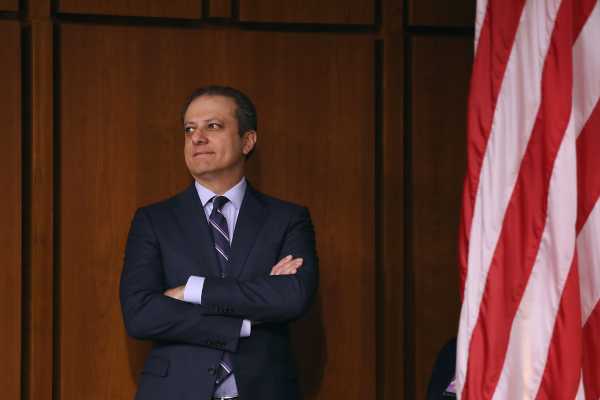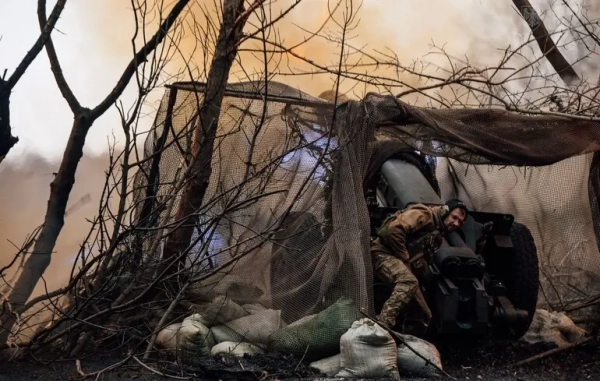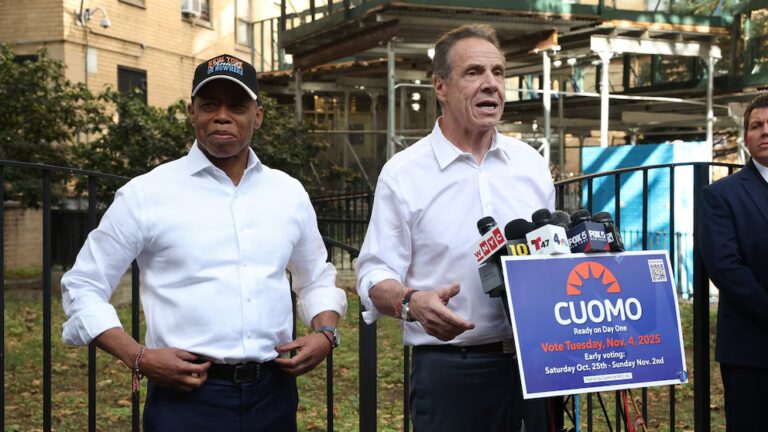
There are perhaps few individuals whose career arcs have been more altered by Donald Trump’s presidency than Preet Bharara. The former US attorney for the Southern District of New York, who was fired by the president last year after refusing to quit, this time last year was Wall Street’s top cop.
He is now a leading voice of the opposition, hosting a podcast, offering a voice of reason on the Russia investigation, and, this week, helping launch a new initiative to turn the norms that failed to restrain Trump into laws that would actually rein in his successors.
In a USA Today op-ed on Monday, Bharara and former New Jersey Republican Gov. Christine Todd Whitman announced the launch of a democracy task force at the Brennan Center for Justice at New York University’s School of Law. The task force’s purpose is to examine norms on items such as financial conflicts, political interference with law enforcement, and the appointment of public officials, and issue recommendations on policies that “can be enacted that mend the gaps in our system and ensure we have a government that functions ably, competently and with the trust of the American people.”
Trump has continually tested the ethical and normative limits, whether by refusing to release his tax returns, remaining entwined in his businesses, or reportedly meddling in the investigation into whether his campaign colluded with Russia. Office of Government Ethics head Walter Shaub quit his job over the summer to join an outside ethics group after clashing with Trump multiple times on conflicts of interest.
Trump’s presidency has revealed how many traditions of the presidency are just that — traditions, not requirements. They’re historical nice-to-haves that assume the president will continue to follow suit. Bharara and Whitman’s task force hopes to give them some teeth.
“It’s taking the lessons and transgressions noted on the part of this administration and preventing those things from happening again in the future,” Bharara told me.
They face an uphill battle. Congress could pass a law tomorrow requiring the president to release his tax returns or truly divest from his businesses. But so far, Republicans on the Hill have been less than eager to constrain the president.
Still, Bharara and Whitman are optimistic. I spoke with Bharara about the task force’s goals, his thoughts on the current state of our union, and what he thinks of some of the recent developments at the Justice Department and the FBI. “Everything is on the table so long as it serves the purpose of figuring out which traditions are no longer acceptable on an honor system and need to be enforced,” he said.
This interview has been edited and condensed for clarity.
Emily Stewart
Can you talk a little bit about this initiative you’ve launched — the democracy task force — what the idea behind it is, and what you’re hoping to get out of it?
Preet Bharara
The idea is, as we lay out in the op-ed, that there are lots of people of goodwill and good faith on both sides of the political aisle and all across the spectrum. And I think a lot of people — and I’ve discovered this just from being in the country as a citizen paying attention, but also from interviewing guests on the podcast — there are a lot of people who believe there are certain things that need to be addressed on a bipartisan basis.
There are a lot of people of good faith that think there is some overreaching going on. And a lot of people are naturally focusing on the everyday, what happens today, what happens tomorrow; the news cycle is so rushed and so crazed that it’s almost like people are reacting in the moment, in a frenzy.
In conversations with the Brennan Center and with other folks, we thought there should be some focus on the long-term detriment to institutions and all the ways in which the current administration — and every administration does some version of this — but the ways in which the current administration is defying all these norms that presents the question: Which of those things should we make sure are codified into hard laws?
We don’t consider this to be partisan at all; that’s why there’s a Republican former governor and me. We have [former Republican senator and defense secretary] Chuck Hagel, we have Don Verrilli, who was Obama’s solicitor general, to really sort of think more deeply over a period of time.
We’re not on a 24-hour deadline. We want to think long-term about the country, ways that we ensure democracy, and there are a lot of things that are on the table. We haven’t convened and done our work yet, but we’re hoping we can make commonsense proposals that can be implemented in the coming years, some of which, maybe, while this president is in office, and some that can be done later.
The example we use in the op-ed is a powerful one. You had two popular presidents, Roosevelt and Kennedy, both of whom did things that the American people decided, “You know what? That was a bit much. It’s a bit rich to put your own brother in as attorney general.” And I think it’s useful, after every presidency, to think about these things, and that’s sort of the animating principle for this.
Emily Stewart
Right, so those examples you cited, FDR staying on for four terms and Congress enacting a two-term limit for presidents; JFK appointing his brother attorney general and Congress passing an anti-nepotism law; all of the laws enacted after Nixon — that all took place in a different moment. Right now, we have a Congress that is funding the government in three-week increments. Do you feel like this might be out of touch with what’s possible right now?
Preet Bharara
The point of this is that it’s a long-term effort. We’re not suggesting we’re going to run through the halls of Congress right now and say, “Pass this thing we drafted overnight!” In fact, that’s how Congress tends to do things, and it doesn’t turn out well.
We’re hoping to have a lot of people who care about the country for different political perspectives, very different political perspectives, think about both what’s good, what’s right, what’s practical, and, my view would be, as one of the co-chairs, what is politically salable to people in the future.
Look, I don’t know what Congress is going to look like in 12 months when the next session is sworn in. There are members of the task force who probably have one view and I have a different view. But I think the hope is that the more voices there are talking about what kinds of reforms you need and what kinds of laws you might need, people will come on board.
The other thing is people are more likely to act with common sense and in the interest of the public if we’re enacting things — and not everyone will love what I’m about to say — if we’re enacting things for the future that will affect the next president, whether it’s a Democrat or a Republican. Some things are impossible to pass because you have political allies of the current administration who don’t want to hamper the current administration. We’re saying there may be things that we need to do to curtail overreaching on the part of the current president.
More importantly, I think, we’re talking about the long-term, not just about Donald Trump but about any future president, Democrat or Republican. And I think a lot of people might get on board — not knowing who the eventual nominee or president will be in the future — on an idea, for example, for there to be a requirement, not just a tradition, that people who run for president disclose their tax returns.
The next time around, it could be a deeply conflicted, rich Democrat running for president who says, “Hey, screw it, Donald Trump didn’t have to do it, I’m not going to do it.” I don’t think Republicans who are currently allies of Donald Trump, because there’s a lot of hypocrisy here we’re looking to cut through, would like that either. So that’s just an example of the kind of thing I think, over time, could be a proposal that carries some weight.
Emily Stewart
So this is really a longer-term play.
Preet Bharara
I mean, we’re not talking about glaciers. But we’re not talking about the 24-hour news cycle. Maybe there are things that we’ll propose in the coming months that can be acted upon quickly, but the thrust of this is to have some time to think deeply and wisely about these issues and develop consensus over time.
Emily Stewart
Is your focus only on the presidency, or are you also planning to look at other areas of government — say, Congress? For example, you have House Republicans voting to release that secret memo put together by Rep. Devin Nunes (R-CA).
Preet Bharara
The heart of this and what spurred it is a look at the executive branch. As Gov. Whitman pointed out on television, yeah, everything’s open. When we’re fully constituted and meeting and talking about it, I think everything is on the table so long as it serves the purpose of figuring out which traditions are no longer acceptable on an honor system and need to be enforced, and that includes regular order in Congress, I suppose. I think that’s an important part of it; I don’t think it’s the central part of it. What we’re talking about more is the executive branch, but other branches are open to discussions, scrutiny, and reform as well.
Emily Stewart
So if you were to boil this down, this is looking for lessons learned from the Trump presidency and how to put that into law.
Preet Bharara
Yeah, the way I always put it — which is a very nerdy way of saying it — is which soft norms should be enacted into hard laws. And yeah, it’s taking the lessons and transgressions noted on the part of this administration and preventing those things from happening again in the future.
Emily Stewart
To shift gears a little bit, what are your thoughts on FBI Deputy Director Andrew McCabe’s exit? The situation, obviously, isn’t entirely similar to yours, but as another Justice Department official [who was] pushed out, what’s your take on it?
Preet Bharara
I don’t know all the facts or the details. There was a report that suggested that [FBI Director] Christopher Wray threatened to resign rather than remove McCabe, and then it looks like it removed McCabe, so I don’t know if there was a change in circumstances.
What I do know is, my personal interactions with Andy McCabe tell me that he is a good and honorable person. I worked cases with him as a junior prosecutor, a line prosecutor, out of the Southern District of New York 15 years ago on the Russian organized crime squad. I know him to be a good, upright, and honorable person, and I don’t like or enjoy the character assassination I see of him and other people.
Emily Stewart
So last week we had this report that President Trump tried to order the firing of special counsel Robert Mueller last summer, and over the weekend, Sen. Lindsey Graham (R-SC) said Trump firing Mueller would be the end of his presidency. What do you think would happen if he did?
Preet Bharara
Lindsey Graham says a lot of things that he changes his mind on, because he’s a politician, like a lot of politicians. And I like Lindsey Graham, but he’s a little bit of a weathervane himself.
What would happen? I don’t know. It would be very bad for the country. A lot of people are on record saying that they would take it very seriously, but that remains to be seen. It’s a real concern and fear that people should have.
Emily Stewart
For just an everyday person looking at the Russia investigation and the Mueller investigation right now, what should they be looking out for to have a sense of the direction it’s going in?
Preet Bharara
My view is, which reporters don’t like, watch and see what the public actions of Bob Mueller are. Nothing speaks more loudly than his announcements of charges, indictments, and guilty pleas, and everything else is speculation.
A lot of these news reports are correct, and a lot of them are not fully correct, and sometimes the devil is in the details. Sometimes, when there are reports that someone in the White House told someone else to do something, it may be more nefarious than is being reported, based on the limited sources that people have, or it may be less nefarious. I’d like to see the results of the actual investigators with subpoena power and grand jury power and see what they come up with.
Emily Stewart
And finally, in light of Trump’s State of the Union address, how would you characterize the state of the union right now?
Preet Bharara
In peril. In peril.
Sourse: vox.com






